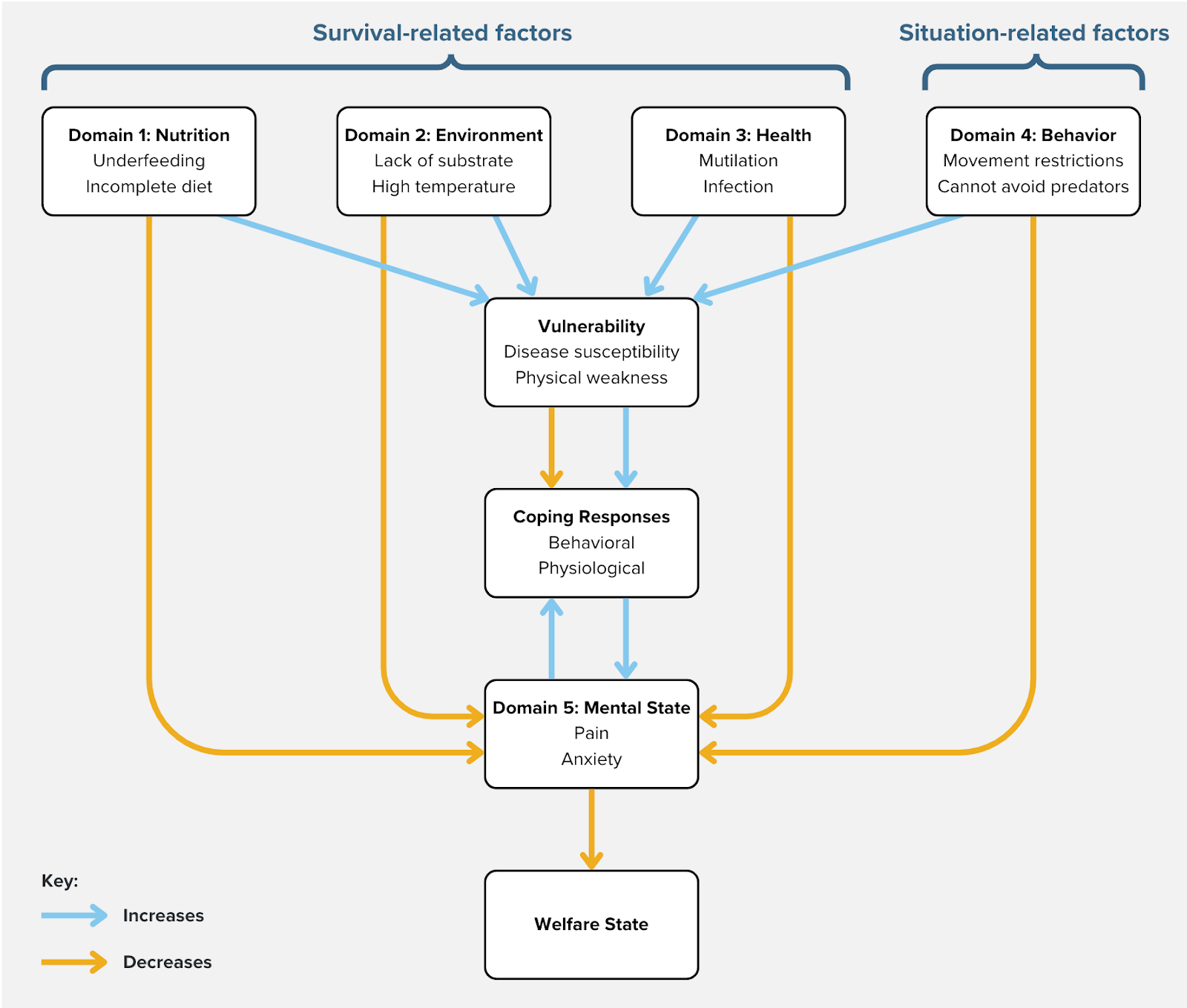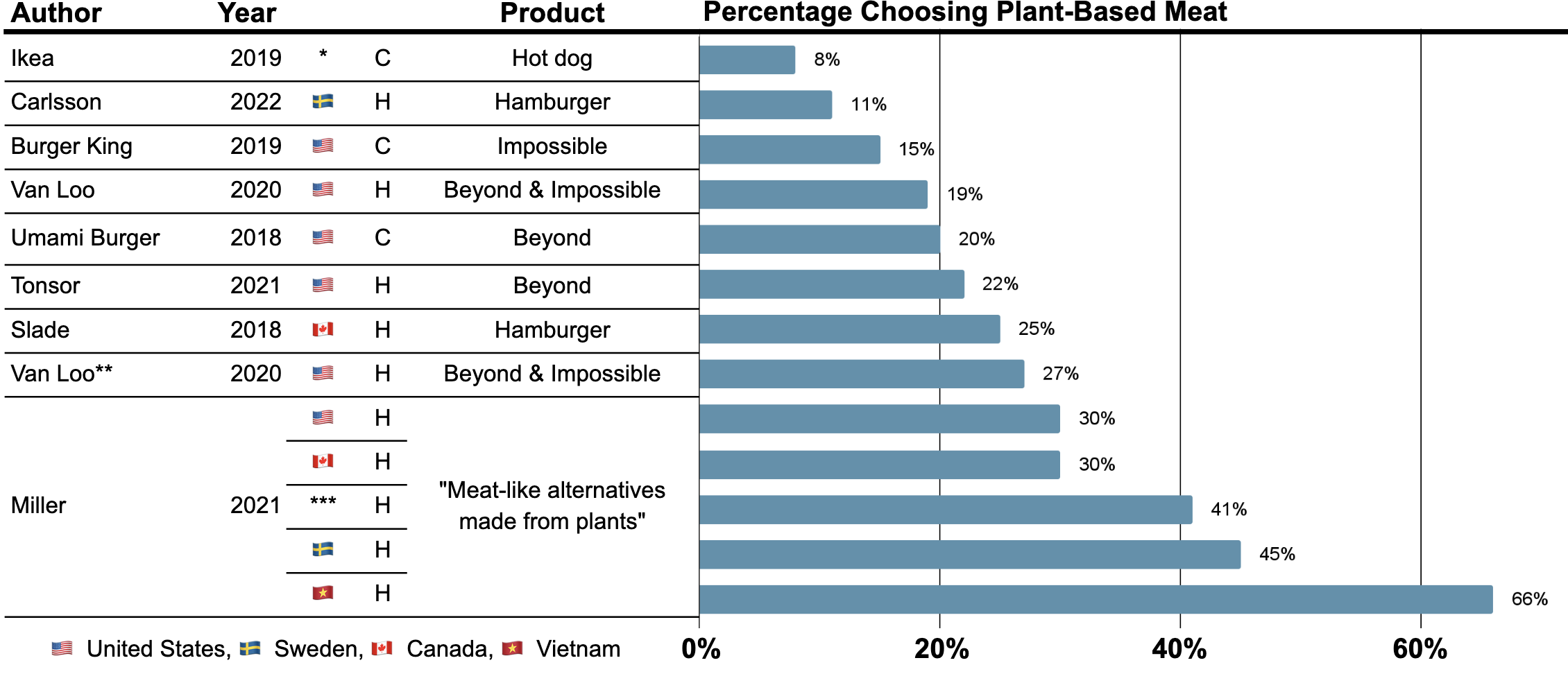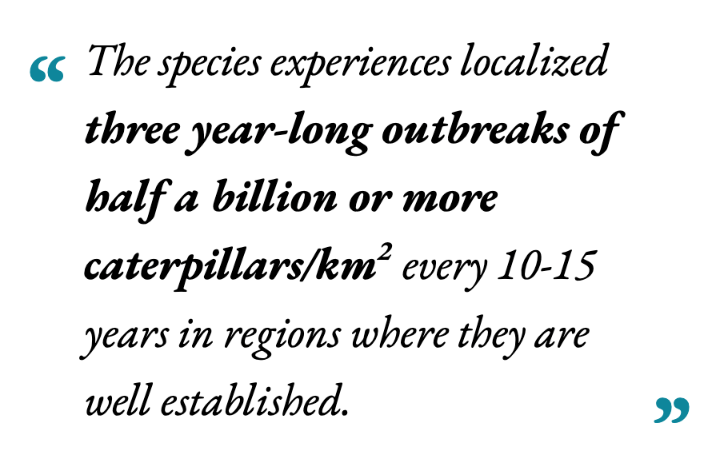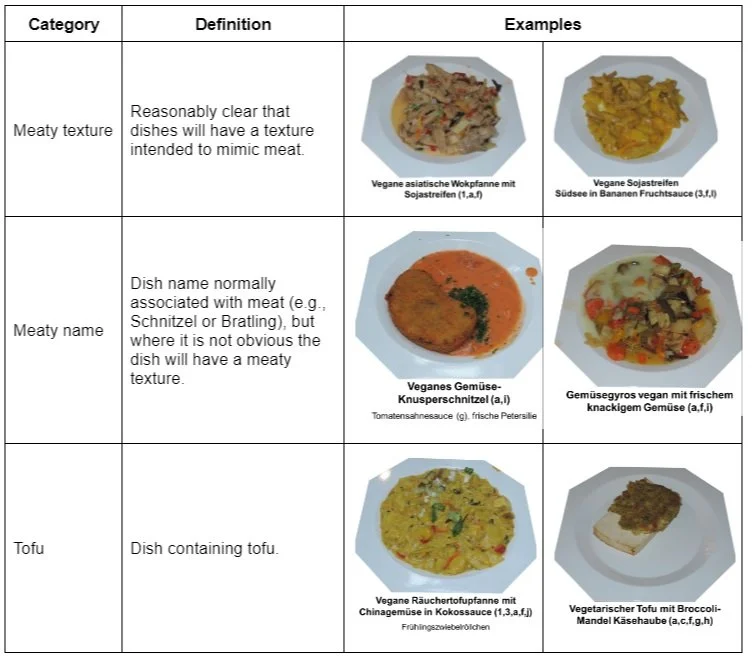
Animal Welfare
There are quadrillions of animals farmed for food, or used and killed for other products by humans. And, there are countless wild animals that face disease, starvation, and predation daily in wild spaces. For many of these animals, we don’t know the fundamental facts about what their lives are like, and what we can do to improve them.
Our research in animal welfare includes studying the industries that use animals, studying the basic facts of life for wild animals, trying to understand difficult questions in interspecies comparisons of value, and working to understand public views about animals and animal welfare. We focus our work on farmed animals, wild animals, and moral weight and animal sentience.
Farmed animals
Over the last 70 years, animals have become increasingly farmed using Concentrated Animal Feeding Operations, also known as CAFOs, or factory farms. The industrialization of these industries has raised new animal welfare issues. The animal welfare movement has increasingly worked to reduce the harm of animal farming or eliminate factory farming. In recent years, this work has focused on campaigns to improve the welfare of laying hens and chickens raised for meat. In the future, new welfare issues might arise due to the mass rearing of insects.
Rethink Priorities supports to work of animal advocacy organizations and grant makers in the space by studying things like the cost-effectiveness of animal welfare campaigns, new opportunities for animal welfare interventions, and by polling public opinion on these issues. We also study the opportunity of plant-based meat alternatives to replace an animal based-food system, reducing animal suffering.
Wild animals
While wild animal advocacy has historically been seen through the lens of conservation and species conservation, little attention is paid in academic environments to the welfare of individual wild animals. But, core to many wild animals’ lives is a survival strategy that inherently involves immense suffering — hundreds or thousands of offspring might be born and die for each individual that makes it to adulthood. The inherent dynamic of these animals’ lives means that there is potentially immense suffering in the natural world. And, as a matter of research, there is little evidence about their lives. Simultaneously to these experiences independent of humans, humans impact wild animals on a massive scale, like the trillions of wild fish that are killed every year for food.
Our work in the space includes studying these evolutionary dynamics, looking into human-animal interactions in the wild, and analyzing proposed interventions to improve the lives of wild animals, like reducing the number of outdoor cats.
Moral weight and animal sentience
When studying animal welfare, often questions arise that are difficult on both empirical and philosophical grounds — what are the experiences of animals like? How should we compare actions that impact animals across different species? Our moral weight and animal sentience research explores which animals we should care about, the evidence for invertebrate sentience, how animal experiences differ from our own, and how we should compare the experiences of different animals.
Animal welfare research
This post summarizes research into the Chinese mantis, focusing on the genes associated with nociception (the ability to perceive noxious stimuli). This type of research may help to improve the conditions on farms to better meet the needs of insects.
Researcher Sagar Shah estimated how cost effective farmed fish slaughter commitments from retailers might be in Europe. His research focused on France, Italy, and Spain because of the large scale of consumption of farmed fish species that don’t benefit from stunning in these countries.
This is the third report in Rethink Priorities’ Shrimp Welfare Sequence, a series that addresses whether and how to best protect the welfare of shrimp. After outlining the welfare threats farmed shrimp may face, this report investigates the effect of these welfare threats on pre-slaughter mortality.
This post is a short summary of research on farmed cricket welfare considerations funded by Rethink Priorities as part of our research agenda on understanding the welfare of insects on farms. The paper includes recommendations.
This post is a short summary of research on yellow mealworm welfare that was funded by Rethink Priorities. The full paper on this research was published in a peer-reviewed, open access journal.
In their review of corporate campaigns for cage-free eggs, our researchers found that, on average, a one-commitment increase leads to a 0.035 (95% CI: 0.01 - 0.06) percentage point rise in the share of cage-free hen housing. Given the large number of hens in the industry, the impact of a few new commitments per year is substantial.
This is the second report in Rethink Priorities’ Shrimp Welfare Sequence. The first report estimated the scale of shrimp farming. This report examines the welfare threats that these individuals face.
Given the number of wild animals that exist, interventions to improve their welfare could have greater expected value than interventions on behalf of other groups. Yet, wild animals receive only a small share of resources earmarked for animal welfare causes. This report explores how different risk aversion frameworks might help increase advocates’ reasoning transparency.
This report summarizes results from Rethink Priorities’ second annual gathering of animal advocates (held in July 2023). Highlights include advocates’ perceptions about how the field should allocate resources.
This blog post examines why people adapt vegetarian and vegan diets. RP’s 2019 survey indicated that the greatest sources of influence were personal interactions, as well as interactions with animals. The importance attributed to social media, online videos, and documentaries is also high, particularly among more recent adopters.
This report builds a strategy based on the strengths, weaknesses, opportunities, and threats of the animal advocacy movement in the European Union (EU) farmed fish policy space.
Rethink Priorities hosted the “Dimensions of Pain” workshop in April 2023 with experts in pain research. The goal was to identify empirical methods to test whether brief but severe pains (e.g. botched slaughter) or milder but longer pains (e.g. lameness) have a greater overall negative impact on farmed animals' welfare. This report summarizes the results and our researchers' updated conclusions.
Much of the optimism around plant-based meats derives from the hypothesis that matching animal-based meats in price, taste, and convenience (PTC) will shift consumption. However, Jacob Peacock’s review of the available evidence suggests that PTC are not the primary determinants of food choice. Even if plant-based meats were price, taste, and convenience competitive, many consumers would still primarily choose animal-based meats.
Decapod crustaceans or, for short, decapods (e.g., crabs, shrimp, or crayfish) represent a major food source for humans across the globe. If these animals are sentient, the growing decapod production industry likely poses serious welfare concerns for these animals.
This report analyzes the results of a survey of attendees at the Effective Animal Advocacy (EAA) Coordination Forum held in September 2022. The attendees represented approximately 20 key groups in the animal advocacy space.
This report estimates the impact and cost-effectiveness of four historical U.S. ballot initiatives that either restricted the use of common animal confinement methods, set minimum per-animal space requirements, and/or mandated cage-free systems for egg-laying hens.
The massive scale of invasive (e.g., non-native) Lymantria dispar dispar (spongy moth) outbreaks represents an unappreciated wild animal welfare issue.
This is a linkpost for a preprint paper submitted for peer review. The report explains how vaccine baits can be used to reduce the costs of dog vaccination campaigns, which are the key to controlling rabies amongst humans.
This post is the third installment in the Rodenticide Reduction sequence. This report describes and ranks interventions to reduce rodenticide use in the U.S. according to their expected impact, neglectedness, and tractability.
While decreasing the prices of plant-based substitutes is a prominent animal welfare strategy, it's possible this approach could increase animal consumption. In a review of 19 studies, Samara Mendez et al. observed wide variation in the relationship between butter and margarine prices and demand.
This post is the second installment in the Rodenticide Reduction sequence. This report explores the reasons why rodenticides are used, under what circumstances they could be replaced, and whether they are replaceable with currently available alternatives.
Senior Researcher Sagar Shah and Senior Research Manager Jacob Peacock conducted a preregistered reanalysis of data from a series of hypothetical discrete choice experiments from Brachem et al. (2019). They explored how meat-free meal selection correlated with the number of meat-free options and the availability of options containing fish/poultry meat or meat-analogues.
This is the ninth post in the Moral Weight Project Sequence, which provides an overview of the research Rethink Priorities conducted between May 2021 and October 2022 on making resource allocation decisions across species. The goal of this post is to help animal welfare grantmakers assess the relative value of improvements to the lives of some commercially-important insects.
This is the eighth post in the Moral Weight Project Sequence, which provides an overview of the research Rethink Priorities conducted between May 2021 and October 2022 on making resource allocation decisions across species. In this post, Senior Research Manager Bob Fischer briefly recaps the research team’s understanding of welfare ranges and their proposed way of using them. The post also summarizes the methodology and responds to some questions and objections.
This is the seventh post in the Moral Weight Project Sequence, which provides an overview of the research Rethink Priorities conducted between May 2021 and October 2022 on making resource allocation decisions across species. In this post, Senior Research Manager Bob Fischer warns against dismissing research just because its findings suggest "the Equality Result" (i.e. that certain species can realize roughly the same amount of welfare as humans).
This is the sixth post in the Moral Weight Project Sequence, which provides an overview of the research Rethink Priorities conducted between May 2021 and October 2022 on making resource allocation decisions across species. In this post, Joe Gottlieb summarizes his full report on phenomenal unity and cause prioritization. He concludes that there is not enough empirical evidence to assume that certain species “house” multiple welfare subjects per individual.
This is the fifth post in the Moral Weight Project Sequence, which provides an overview of the research Rethink Priorities conducted between May 2021 and October 2022 on making resource allocation decisions across species. This post assesses the hypothesis that brains have many conscious subsystems, which could affect how we ought to make tradeoffs between members of different species.
Approximately 200-300 billion black soldier flies are farmed annually. In a new post, academic collaborator Meghan Barrett (Ph.D. Entomology) summarizes and provides additional context related to her and her colleagues’ academic article on “Welfare considerations for farming black soldier flies, Hermetia illucens (Diptera: Stratiomyidae): a model for the insects as food and feed industry.”
This is the fourth post in the Moral Weight Project Sequence. The aim of the sequence is to provide an overview of the research that Rethink Priorities conducted between May 2021 and October 2022 on interspecific cause prioritization—i.e., making resource allocation decisions across species. The aim of this post is to summarize our full report on the use of neuron counts as proxies for moral weights.
Voluntary certification schemes (VCS) specify production standards and auditing processes. International VCSs are one of the few current governance tools to improve the welfare of farmed fishes and shrimps. Knowing to what degree farmers register with certification schemes and what influences their decisions may inform future uses of this animal welfare advocacy strategy. This shallow literature review addresses the determinants considered by exporting farmers in China and Thailand.
